Headlines
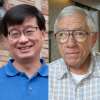 The Gold and Silver Medals are the highest and second highest honors granted by the Department of Commerce for distinguished and exceptional performance. Jun Ye was awarded a Gold Medal and Judah Levine was awarded a Silver Medal for Scientific/Engineering Achievement.
The Gold and Silver Medals are the highest and second highest honors granted by the Department of Commerce for distinguished and exceptional performance. Jun Ye was awarded a Gold Medal and Judah Levine was awarded a Silver Medal for Scientific/Engineering Achievement.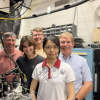 A multi-university research team, including engineers and physicists from CU Boulder and NIST, will build technology and tools to improve measurement of important climate factors by observing atoms in outer space. The new Quantum Pathways Institute is led by the University of Texas at Austin.
A multi-university research team, including engineers and physicists from CU Boulder and NIST, will build technology and tools to improve measurement of important climate factors by observing atoms in outer space. The new Quantum Pathways Institute is led by the University of Texas at Austin. Professor Scott Diddams, who serves as faculty director of the College of Engineering and Applied Science's Quantum Engineering Initiative (QEI), has been selected for the 2023 C.E.K. Mees Medal from Optica (formerly OSA) for his pioneering innovations in optical frequency combs.
Professor Scott Diddams, who serves as faculty director of the College of Engineering and Applied Science's Quantum Engineering Initiative (QEI), has been selected for the 2023 C.E.K. Mees Medal from Optica (formerly OSA) for his pioneering innovations in optical frequency combs. The CUbit Quantum Initiative at CU Boulder has appointed physics professor Noah Finkelstein to serve as faculty director of education and workforce. Finkelstein will lead CUbit’s establishment of a coordinated educational approach that cultivates leaders of the next-generation quantum workforce.
The CUbit Quantum Initiative at CU Boulder has appointed physics professor Noah Finkelstein to serve as faculty director of education and workforce. Finkelstein will lead CUbit’s establishment of a coordinated educational approach that cultivates leaders of the next-generation quantum workforce.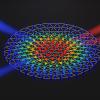 JILA and NIST Fellow Ana Maria Rey collaborated with NIST, the University of Innsbruck and Rutgers University to design a trapped-ion simulator for 2D p-wave superconductors—paving the way for clean observations of the predicted non-equilibrium dynamics in future experiments using the Penning trap.
JILA and NIST Fellow Ana Maria Rey collaborated with NIST, the University of Innsbruck and Rutgers University to design a trapped-ion simulator for 2D p-wave superconductors—paving the way for clean observations of the predicted non-equilibrium dynamics in future experiments using the Penning trap.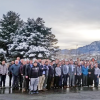 Photonic integrated circuit (PIC) technologies are critical to enabling, advancing and miniaturizing quantum systems. Workshop attendees learned about the language of the PIC industry and explored opportunities to accelerate development and adoption of the technology.
Photonic integrated circuit (PIC) technologies are critical to enabling, advancing and miniaturizing quantum systems. Workshop attendees learned about the language of the PIC industry and explored opportunities to accelerate development and adoption of the technology.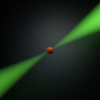 JILA Fellow Cindy Regal and JILA and NIST Fellow Ana Maria Rey have teamed up with Oriol Romero-Isart, a professor at the University of Innsbruck, to show that a trapped particle in the form of an atom readily reveals its full quantum state with quite simple ingredients.
JILA Fellow Cindy Regal and JILA and NIST Fellow Ana Maria Rey have teamed up with Oriol Romero-Isart, a professor at the University of Innsbruck, to show that a trapped particle in the form of an atom readily reveals its full quantum state with quite simple ingredients. JILA and NIST scientists, collaborating with Colorado-based quantum computing company Quantinuum, have developed a set of protocols to test for a quantum sensor's upper bound using the integrated Quantum Fisher Information (IQFI) value. Their study was recently published in Physical Review Applied.
JILA and NIST scientists, collaborating with Colorado-based quantum computing company Quantinuum, have developed a set of protocols to test for a quantum sensor's upper bound using the integrated Quantum Fisher Information (IQFI) value. Their study was recently published in Physical Review Applied. Dr. Liao serves as assistant director of research and knowledge transfer for STROBE, an NSF Science and Technology Center. His research interests include developing and utilizing coherent light sources from infrared to x-ray regimes to study condensed matter physics and materials science.
Dr. Liao serves as assistant director of research and knowledge transfer for STROBE, an NSF Science and Technology Center. His research interests include developing and utilizing coherent light sources from infrared to x-ray regimes to study condensed matter physics and materials science.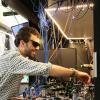 Professor Adam Kaufman (Physics), a JILA fellow and NIST physicist, has been awarded a grant as part of the 2023 Young Investigator Research Program (YIP), launched by the Air Force Office of Scientific Research. YIP recipients receive three-year grants of up to $450K.
Professor Adam Kaufman (Physics), a JILA fellow and NIST physicist, has been awarded a grant as part of the 2023 Young Investigator Research Program (YIP), launched by the Air Force Office of Scientific Research. YIP recipients receive three-year grants of up to $450K.

